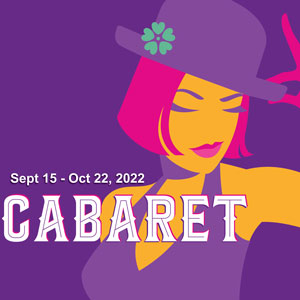
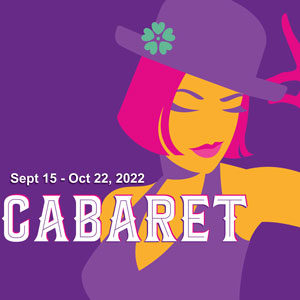 [rating=5]The Metropolis’s revival of the 1998 version of the musical “Cabaret” is an exemplary achievement. Director Robbie Simpson and musical director Jake Hartge have brilliantly joined
[rating=5]The Metropolis’s revival of the 1998 version of the musical “Cabaret” is an exemplary achievement. Director Robbie Simpson and musical director Jake Hartge have brilliantly joined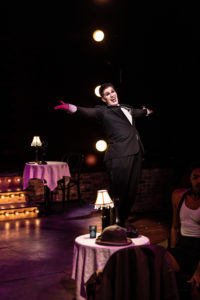 forces to craft a splendid spectacle, true to the book by Joe Masteroff. With music by John Kander and lyrics by Fred Ebb, the show is largely built around the venue of a cabaret, with songs that are not only well-known but remarkably hummable. It is likewise filled with licentious dance numbers that are fun and frolicky, due to the outstanding work of associate director and choreographer Jenilee Houghton, who also doubles as the hair and makeup designer. Sprinkled with humor and gaiety, this show holds up as well in the current era as when the original version was first produced in 1966. There are several reasons for this. First, there is an openness regarding sexual orientation and fluidity when it comes to gender identification. The second reason has to do with politics. We cannot escape the parallels between then and now regarding the rise of far right-wing parties globally and how ideologies of hate and intolerance can spread within a society that perceives of itself as being advanced. Hence this show, despite its superficial lightheartedness, is ultimately a drama and a commentary about how ordinary people cope with living through difficult times—and what can happen when feelings of powerlessness, frustration, and anger take over when democracy recedes and autocracy advances.
forces to craft a splendid spectacle, true to the book by Joe Masteroff. With music by John Kander and lyrics by Fred Ebb, the show is largely built around the venue of a cabaret, with songs that are not only well-known but remarkably hummable. It is likewise filled with licentious dance numbers that are fun and frolicky, due to the outstanding work of associate director and choreographer Jenilee Houghton, who also doubles as the hair and makeup designer. Sprinkled with humor and gaiety, this show holds up as well in the current era as when the original version was first produced in 1966. There are several reasons for this. First, there is an openness regarding sexual orientation and fluidity when it comes to gender identification. The second reason has to do with politics. We cannot escape the parallels between then and now regarding the rise of far right-wing parties globally and how ideologies of hate and intolerance can spread within a society that perceives of itself as being advanced. Hence this show, despite its superficial lightheartedness, is ultimately a drama and a commentary about how ordinary people cope with living through difficult times—and what can happen when feelings of powerlessness, frustration, and anger take over when democracy recedes and autocracy advances.
Starring Tim Foszcz as Clifford Bradshaw, Kristin Doty as Sally Bowles, and Maria Alexandra as the Emcee, “Cabaret” is a story set in Berlin, Germany, between the two world wars. The narrative is in the picaresque style. Cliff is an itinerant American journalist, who travels overseas to write his novel and some freelance pieces for a newspaper while earning a living by teaching English. On the train to Berlin, he meets Ernst Ludwig (Daniel Leahy), who becomes his good friend, and subsequently becomes acquainted with Fraulein Schneider (Rosalind Hurwitz), who owns the rooming house where he eventually resides. While in Berlin, he experiments sexually, has affairs with both men and women, and finally meets Sally Bowles, a British singer and the lead performer at the Kit Kat Club. The two have an immediate attraction for each other—and, of course, they both speak English. Cliff believes that he has found his true love in Sally and really wants to be involved with her and the baby she is carrying (presumably his, but we don’t know).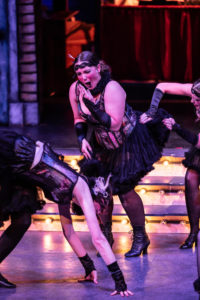
Although the story is set in Berlin in 1929, “Cabaret” actually condenses the social and cultural history of 1930s Germany in order to make its point about the violence and hate that lead up to World War II and the Holocaust, The Germans of this era had lived through the bombings and destruction of World War I (with Germany being on the losing side of the Great War), followed by massive inflation throughout the 1920s. With this punishing string of events, the average German wanted a return to normalcy, turning a blind eye to issues of politics and thus allowing for the rise of the Nazi movement and strongman Adolf Hitler. As Fraulein Schneider reminds us, many people at the time believed that “Nazism will just blow over.” But obviously this was not meant to be, and the Nazi youth song “Tomorrow Belongs to Me” is prescient of things to come. The slowly increasing anti-Jewish sentiment culminates in the throwing of the brick through the window of the grocery store owned by Herr Schmidt (Anthony Whitaker), followed by Fraulein Schneider (who is not Jewish) deciding to cancel her engagement to him; there’s also the arrest of a Jewish cabaret dancer. Similarly, the anti-homosexual sentiment is shown by growing hostility aimed at gays, which is ultimately demonstrated when the cabaret’s emcee has to choose whether to become a Nazi or a concentration camp prisoner: not a pleasant prospect either way.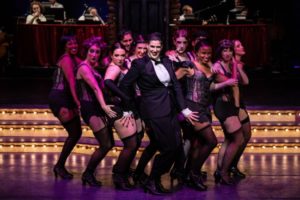
Cliff constantly observes a political situation that grows more intolerable as the days wear on. As an antifascist who abhors the Nazis, he notices how segments of the German population have become increasingly marginalized and despised, while the bulk of the population remains largely unfazed. When people he knows are being called slurs or are getting beat up and are no longer able to live their lives in peace, he decides to leave Berlin for his home in Pennsylvania and wants Sally to come along with him. But while Sally abhors the current political environment too, she cannot see past her own need to have an audience and to be in a crowd of people; and she cannot see herself settling into a relatively obscure, family-oriented lifestyle with Cliff. In short, she does not want to escape Germany, but she’s also a prisoner of her own past. So she chooses to ignore the potential threat that the Nazis might be to her and her acquaintances. And while Cliff, the American, can leave Germany at will and reminisce about the people he met in Berlin, those he has left behind must deal with the vicissitudes of government, politics, and popular opinion, not knowing what the future might bring.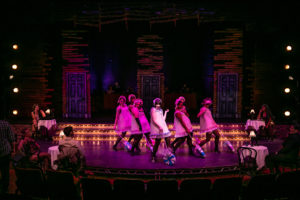
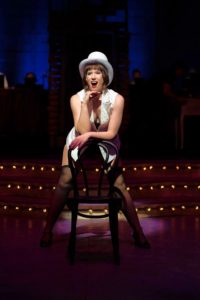 Costumes are superior in this production, thanks to the fine work of Samantha Sharp and Mary Baca. While each and every garment is fantastic, one of my personal favorites is the slinky black dress with the diagonal diamond trim and chiffon and the red feathered boa that Sally Bowles wears, and also the red dress while she sings the highly recognizable title song “Cabaret” in the second act. The cabaret singers and dancers are beautifully garbed and coifed, adding to the entertainment value of the show. The set by scenic designer Eric Luchen is creative and versatile and works especially well for the rooming house scenes. I especially liked the moving props by Patrick McGuire and Kelly Neuls that allow the actors to shift scenes quickly and convincingly, such as being inside a performance hall to being inside a train car to being outside the rooming house. And of course, the music is fantastic! The orchestra is made up of musical director Hartge (piano/conductor), who is also the sound engineer, plus Ryan Adams (trumpet), Sophie Cruetz (reeds), Anthony Scandora (drums), Mike Lockler (guitar/banjo), Bobby Dietz (keyboard), and William Kort (trombone). I loved how the graphic artist beautifully coordinated shades of purple, hot pink, gold, and seafoam green on the posters, online programs, and other publicity for “Cabaret”, not to mention the other shows being featured by the Metropolis Performing Arts Centre this season.
Costumes are superior in this production, thanks to the fine work of Samantha Sharp and Mary Baca. While each and every garment is fantastic, one of my personal favorites is the slinky black dress with the diagonal diamond trim and chiffon and the red feathered boa that Sally Bowles wears, and also the red dress while she sings the highly recognizable title song “Cabaret” in the second act. The cabaret singers and dancers are beautifully garbed and coifed, adding to the entertainment value of the show. The set by scenic designer Eric Luchen is creative and versatile and works especially well for the rooming house scenes. I especially liked the moving props by Patrick McGuire and Kelly Neuls that allow the actors to shift scenes quickly and convincingly, such as being inside a performance hall to being inside a train car to being outside the rooming house. And of course, the music is fantastic! The orchestra is made up of musical director Hartge (piano/conductor), who is also the sound engineer, plus Ryan Adams (trumpet), Sophie Cruetz (reeds), Anthony Scandora (drums), Mike Lockler (guitar/banjo), Bobby Dietz (keyboard), and William Kort (trombone). I loved how the graphic artist beautifully coordinated shades of purple, hot pink, gold, and seafoam green on the posters, online programs, and other publicity for “Cabaret”, not to mention the other shows being featured by the Metropolis Performing Arts Centre this season.
I happened to attend the ASL (American Sign Language) performance on September 22nd, where there were a few audience members who required ASL assistance. Watching the two interpreters do their jobs was just as interesting as watching the performers on stage themselves, and I’d highly recommend that the hearing public see at least one ASL production at some point during their theatregoing. Since “Cabaret” is a musical, it was fun to see how the interpreters dramatically and rhythmically signed the words to the songs. Since I was already familiar with the story and the music, I could nicely shift my attention between watching the performers and the interpreters, who sat off to one side below the stage.
attention between watching the performers and the interpreters, who sat off to one side below the stage.
“Cabaret” is intended for patrons age 15+. It “contains mature themes including anti-Semitism, abortion, Nazi imagery, hate crimes, domestic violence, and depicted drug use.” Yet the circumstances that the show describes are not unfamiliar in today’s United States. In fact, what happened ninety years ago can serve as a warning about how neofascist organizations can gain a foothold in European and American society. We all witnessed the Unite the Right rally in Charlottesville, Virginia, on August 12, 2018, and the Capitol Insurrection on January 6, 2021. When the norms of a democratic society break down in favor of violent action, the erosion of human rights is not far behind.
“Cabaret” is playing through October 22, 2022, at the Metropolis Performing Arts Centre, 111 W. Campbell Street, in Downtown Arlington Heights.
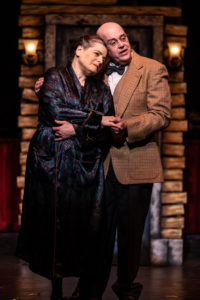 Performances are:
Performances are:
Tickets are $45 and can be purchased online at https://app.arts-people.com/index.php?show=138266, where you will also see the latest COVID requirements.
Alternatively, you may phone at 847-577-2121, or email customerservice@metropolisarts.com to purchase tickets.
For more information about the show, please go to: https://www.metropolisarts.com/event/cabaret/.
For general information about the various programs and offerings at the Metropolis Performing Arts Centre, visit: https://www.metropolisarts.com/.
Note that Arlington Alfresco, the outdoor dining experience in downtown Arlington Heights, is currently in effect, and there are some street closures, including directly in front of the theatre. Please refer to this map, as well for parking information in nearby garages: https://cdn5-hosted.civiclive.com/UserFiles/Servers/Server_7230689/File/News/Alfresco%20Visitor%20Parking.pdf.
To see what others are saying, visit www.theatreinchicago.com, go to Review Round-Up and click at “Cabaret”.



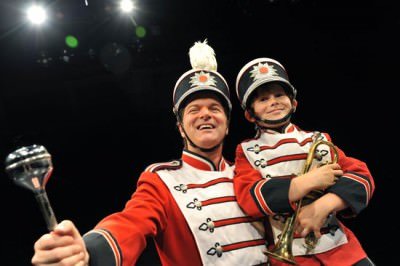
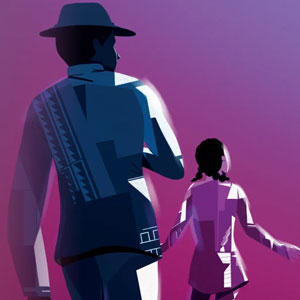
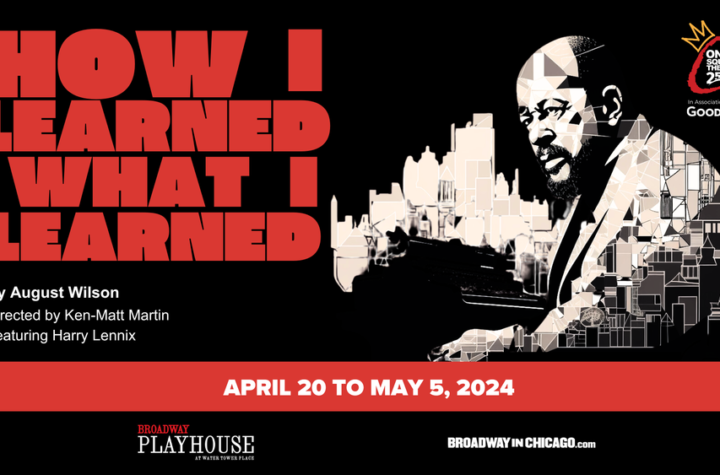
More Stories
“Barefoot in the Park”
“Joe Turner’s Come and Gone”
“How I Learned What I Learned” reviewed by Julia W. Rath